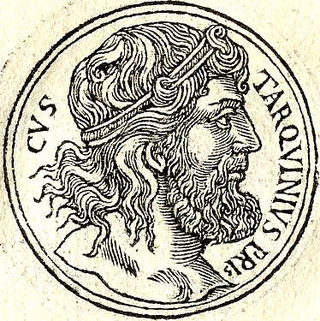
Lucius Tarquinius Priscus, or Tarquin the Elder, was the legendary fifth king of Rome and first of its Etruscan dynasty. He reigned for thirty-eight years. Tarquinius expanded Roman power through military conquest and grand architectural constructions. His wife was the prophetess Tanaquil.
Year 389 (CCCLXXXIX) was a common year starting on Monday of the Julian calendar. At the time, it was known as the Year of the Consulship of Timasius and Promotus. The denomination 389 for this year has been used since the early medieval period, when the Anno Domini calendar era became the prevalent method in Europe for naming years.
From its origin as a city-state on the peninsula of Italy in the 8th century BC, to its rise as an empire covering much of Southern Europe, Western Europe, Near East and North Africa to its fall in the 5th century AD, the political history of Ancient Rome was closely entwined with its military history. The core of the campaign history of the Roman military is an aggregate of different accounts of the Roman military's land battles, from its initial defense against and subsequent conquest of the city's hilltop neighbors on the Italian peninsula, to the ultimate struggle of the Western Roman Empire for its existence against invading Huns, Vandals and Germanic tribes. These accounts were written by various authors throughout and after the history of the Empire. Following the First Punic War, naval battles were less significant than land battles to the military history of Rome due to its encompassment of lands of the periphery and its unchallenged dominance of the Mediterranean Sea.

The Third Servile War, also called the Gladiator War and the War of Spartacus by Plutarch, was the last in a series of slave rebellions against the Roman Republic known as the Servile Wars. This third rebellion was the only one that directly threatened the Roman heartland of Italy. It was particularly alarming to Rome because its military seemed powerless to suppress it.

Lodève is a commune in the département of Hérault, in the Occitanie region in southern France. It is a sub-prefecture of the department. The derivation of the city's name is from Gaulish Luteva, composed of lut-, swamp, mud + suffix -eva. It might therefore translate as the muddy place or the swamp city. This mud could be a clay, called argillite, which was use during ancient history to produce pottery.

The gens Aquillia or Aquilia was a plebeian family of great antiquity at ancient Rome. Two of the Aquillii are mentioned among the Roman nobles who conspired to bring back the Tarquins, and a member of the house, Gaius Aquillius Tuscus, was consul in 487 BC.
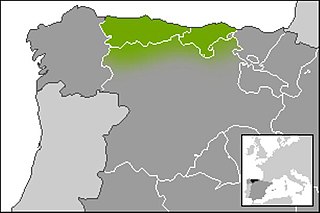
The Cantabrian Wars, sometimes also referred to as the Cantabrian and Asturian Wars, were the final stage of the two-century long Roman conquest of Hispania, in what today are the provinces of Cantabria, Asturias and León in northwestern Spain.

Saint-Flour is a commune in the Cantal department in the Auvergne region in south-central France, around 100 km south of Clermont-Ferrand. Its inhabitants are called Sanflorains.
Gessius Florus was the 7th Roman procurator of Judea from 64 until 66.
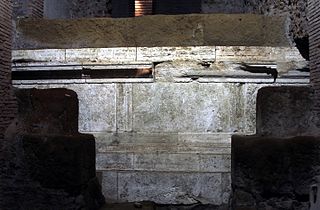
The Temple of Veiovis in ancient Rome was the temple of the god Veiovis, built sometime in the early 1st century BC.

Saint-Flour Cathedral is a Roman Catholic church located in the town of Saint-Flour in the Auvergne, France. The dedication is to Saint Peter and Saint Florus, the first bishop of Lodève, who is also the eponym of the town. It has been a monument historique since 30 October 1906.

The Bishopric of Lodève is a former Roman Catholic diocese in southern France. Its episcopal see was located in Lodève, in the modern department of Hérault. Its territory is now part of the archdiocese of Montpellier.

Lodève Cathedral is a Roman Catholic church in Lodève, Hérault, southern France. The edifice is a typical example of local Gothic architecture.

Julius Caesar was assassinated by a group of senators on the Ides of March of 44 BC during a meeting of the Senate at the Curia of Pompey of the Theatre of Pompey in Rome where the senators stabbed Caesar 23 times. They claimed to be acting over fears that Caesar's unprecedented concentration of power during his dictatorship was undermining the Roman Republic. At least 60 to 70 senators were party to the conspiracy, led by Marcus Junius Brutus, Gaius Cassius Longinus, and Decimus Junius Brutus Albinus. Despite the death of Caesar, the conspirators were unable to restore the institutions of the Republic. The ramifications of the assassination led to his martyrdom, the Liberators' civil war and ultimately to the Principate period of the Roman Empire.
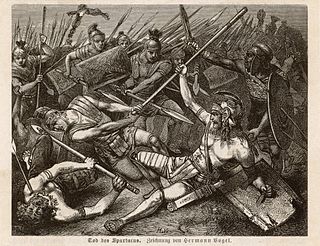
Spartacus was a Thracian gladiator (Thraex) who, along with Crixus, Gannicus, Castus, and Oenomaus, was one of the escaped slave leaders in the Third Servile War, a major slave uprising against the Roman Republic. Little is known about him beyond the events of the war, and surviving historical accounts are sometimes contradictory. All sources agree that he was a former gladiator and an accomplished military leader.
Gaius Aquillius may refer to:
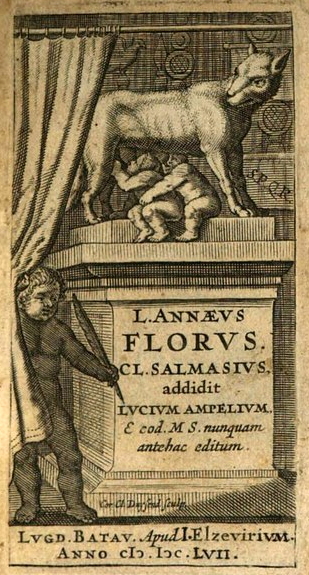
Three main sets of works are attributed to Florus : Virgilius orator an poeta, the Epitome of Roman History and a collection of 14 short poems. As to whether these were composed by the same person, or set of people, is unclear, but the works are variously attributed to:
Saint Florus was the legendary first bishop of Lodève. He evangelised in Languedoc and the Auvergne, and was martyred in about 389.
Gessius, Gessios, Gesios or Gesius may refer to:
This page is based on this
Wikipedia article Text is available under the
CC BY-SA 4.0 license; additional terms may apply.
Images, videos and audio are available under their respective licenses.











